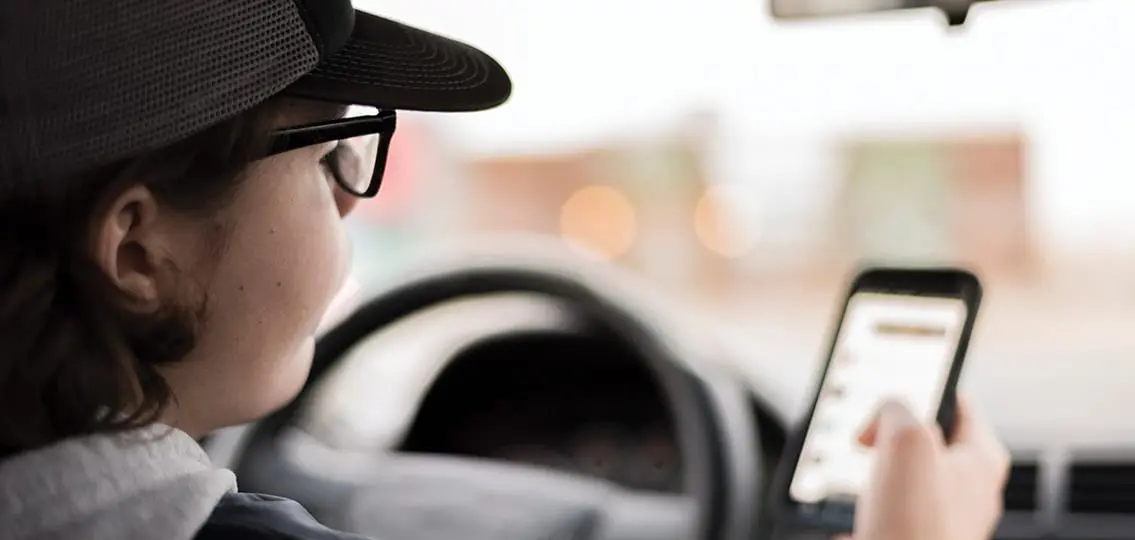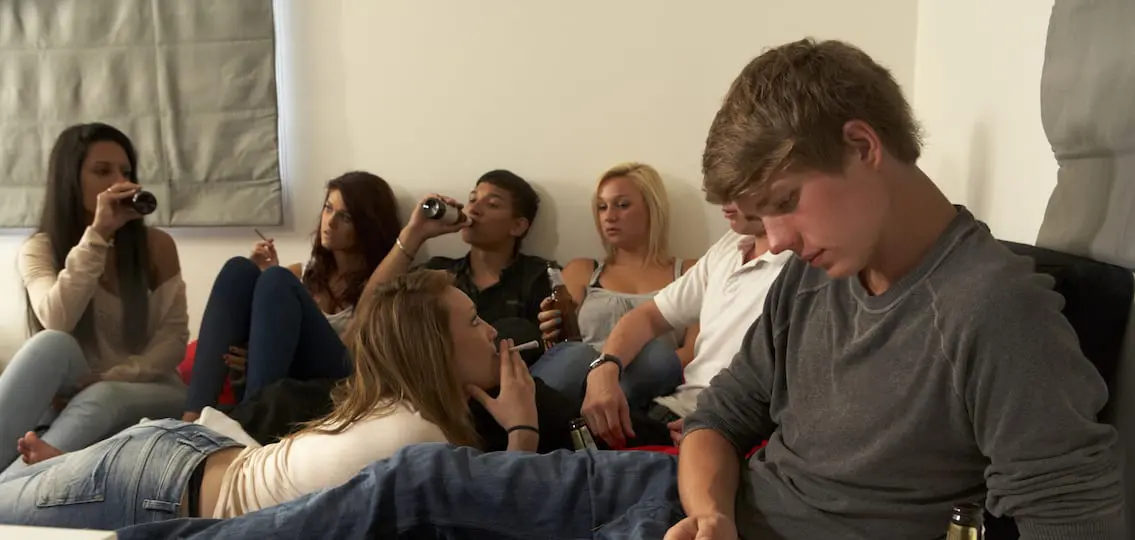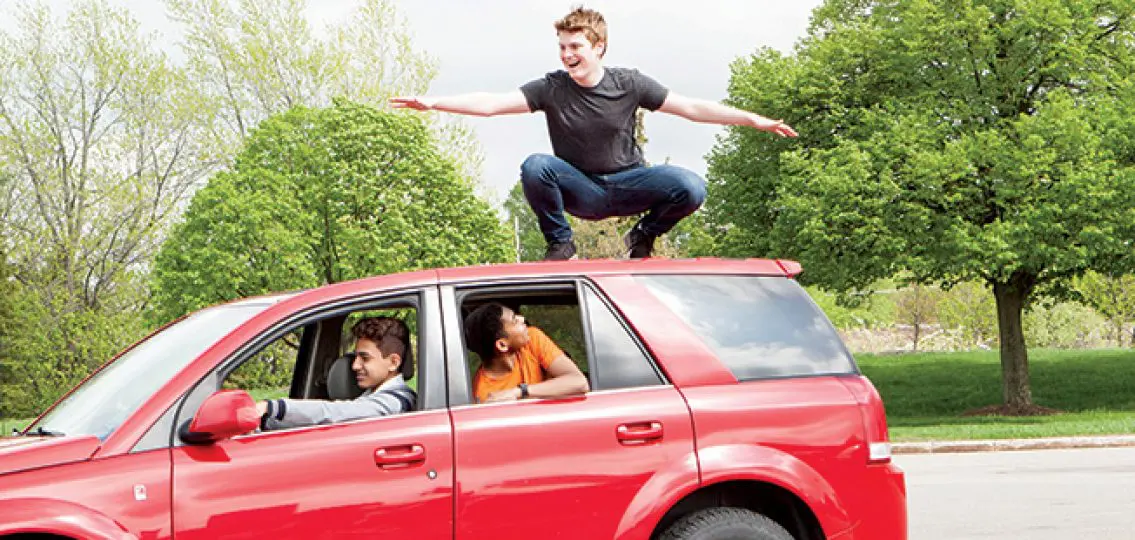Mark was away for work when his wife messaged him. They’d gotten a call from their daughter’s high school with the news that she had sneaked alcohol into the building in her school bag to drink with friends.

Mark and his wife expected their daughter, a freshman, to tell them there must be some mistake. However, to their surprise, she confessed. “We learned in that moment that as lovely, beautiful, and kind as our child is, she was capable of bad behavior,” says Mark.
What makes teens—even “good kids”—do things that are risky and likely to land them in trouble? For one thing, they’re built that way.
“Adolescents take chances because their brains are wired to take risks,” explains Jess P. Shatkin, M.D., author of Born to Be Wild: Why Teens Take Risks and How We Can Keep Them Safe. “But it takes about 10 more years for the brain’s prefrontal cortex, which helps with impulse control, to develop and make decisions about what’s safe and what’s not.” That’s many parenting years spent lying awake at night worrying.
Most young adults don’t reach full brain maturity until about age 25, research shows.
However, not all risk-taking is inherently bad. Teens can get a rush of the feel-good brain chemical dopamine from taking positive chances, too—like wanting to take the harder honors class, working up the courage to perform in the school talent show, or taking advantage of an opportunity to travel to another part of the world. And teens who embrace risks may reap another benefit: They’re faster learners, according to research published in The Journal of Research on Adolescence.
“Teens have an internal struggle of still being a kid and wanting to explore their independence,” says Alison S. Tothy, M.D., associate professor of pediatrics at the University of Chicago Medicine. “You probably see this several times over the course of a day. One minute they’re saying, ‘Leave me alone. I’ve got it;’ then all of a sudden they’re turning to you saying, ‘Help!’”
There is, of course, also peer pressure, and the desire to fit in and be liked—which make the very real risks of drug and alcohol abuse so worrisome. “As parents, it’s hard for us because we’ve spent the past 12 to 14 years being sort of the center of their universe, and developmentally we no longer are—their peers are becoming that center,” says Dr. Tothy. And those kids have a lot of influence on your teenager’s decision making right now.
7 Guidelines to Help Teens Navigate the Risks:
1. Help them branch out.
Maybe you’re not crazy about their squad at school. On some level, they may not be, either—but it can be intimidating for a teen to break social ranks at school. “Ask yourself what other ways your teenager can meet kids outside their usual social circle,” says Dr. Tothy. Think beyond standing up and moving to another lunch table—that can be really hard for a tween or teen to do, says Dr. Tothy.
Instead, look outside school. Is there a writing program in your city, a youth group at your place of worship, or a social justice cause your teen is passionate about where they can find like-minded peers? “Some kids take a lot of initiative, but some still need to be scheduled by their parents,” says Dr. Tothy. “It’s okay to help them find those social avenues.”
2. Surround them with positive adults.
You can’t pick your kid’s friends, but you can influence who the adults in their world are. “Surround your child with people who have the ability to be a positive influence in their lives,” says Dr. Tothy. That may be an extended-family member, a coach, or a leader in your community whom they can volunteer or intern with. “It’s about making sure that village is there supporting your teen,” says Dr. Tothy. “There will be other adults having the same conversations with them about good decision-making, just in different voices and ways.”
3. Role play scenarios.
At some point, your teen is going to be in a situation where they will be offered alcohol, drugs, or a vaping device. Go over the different ways they can respond. “Talk through specific scenarios: ‘You’re going to a party, and there may be alcohol, and you’re not 21. What are you going to say or do so you can stand strong and don’t feel ostracized?’” says Dr. Tothy. Come up with scripts together, from a firm “No thanks” to “I’m taking medicine and can’t drink.”
Walk through what your teen can do in an emergency. Make a pact that they can call you no matter the time of night, no questions asked, rather than getting behind the wheel or into a car with someone who’s been drinking. In the 2016 Youth Risk Behavior Survey from the Centers for Disease Control, teens were much less likely to binge drink if their parents monitored them and showed warmth and support in doing so.
4. Save awkward conversations for no-exit spaces.
The car can be a great place to have conversations—say, a talk about condoms—that may be necessary but might otherwise bring your teen death by embarrassment. “You get to say, ‘I’m not going to look at you, you’re not going to look at me, but we’re going to talk about something important, and you get to roll your eyes all you want since I’m driving and can’t see you.’” says Dr. Tothy. Stay the course through their protests, she says—they’ll still hear your message.
5. Stand firm when they mess up.
“There has to be some autonomy and trust, but when a kid does something that takes away that trust, they have to earn it back,” says pediatrician Cora Collette Breuner of Seattle Children’s Hospital. It can be difficult to enforce consequences, she says—when you ground your teen, you’re pretty much grounding yourself too, since you will most likely need to be home to supervise them.
It also takes strength, she adds, to address phone privileges: If you want your teen to put their phone away at 9 p.m. (or whatever the cutoff is in your home), then ideally you’ll put your phone away, too.
6. Don’t hold on to resentment.
The teen years are rough, and it can be difficult to keep your cool. “It’s really hard when your kid loves you one day and hates you the next, but you’ve got to learn not to take that part personally,” says Dr. Tothy, especially if you want to have an open dialogue with your teen. If you want to remain approachable to your child, you’ll need to find the strength to let go of the grudge.
7. Praise them for what they’re doing well.
You don’t have to be heavy-handed about it, says Dr. Tothy. (They will give you side-eye if you try to compliment them for simple things like using a seatbelt.) But don’t be shy about encouraging healthy efforts at independence, like taking a school trip, even if you’re secretly worried they’re going to lose their passport. Says Dr. Breuner: “It can be easy to focus on what they seem to be doing wrong, but noticing and complimenting good decision-making can help reinforce smart behavior.”





